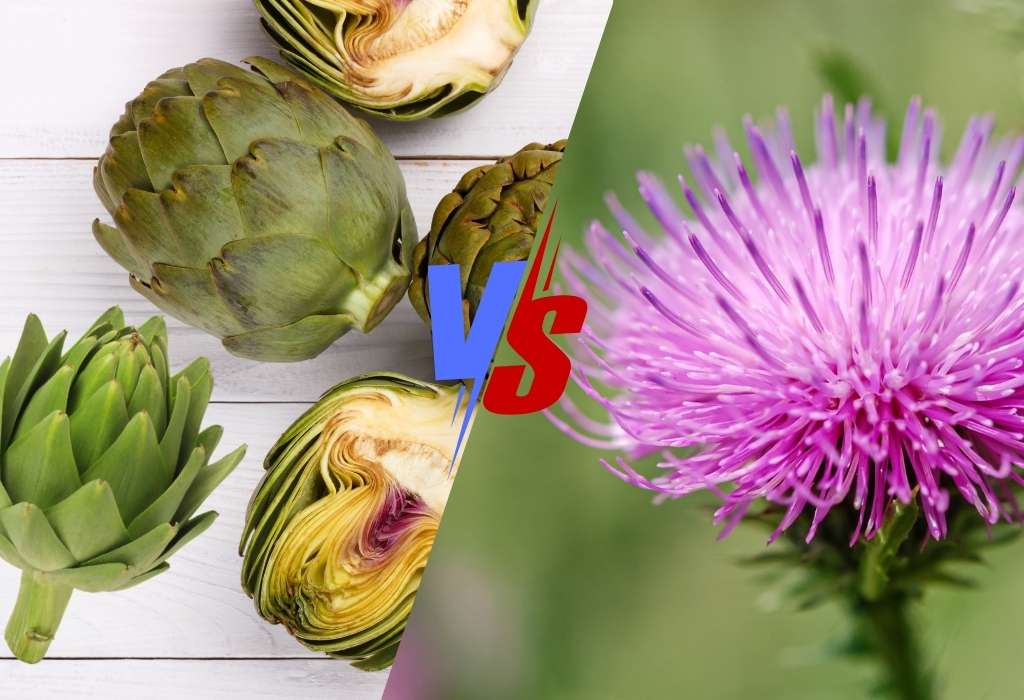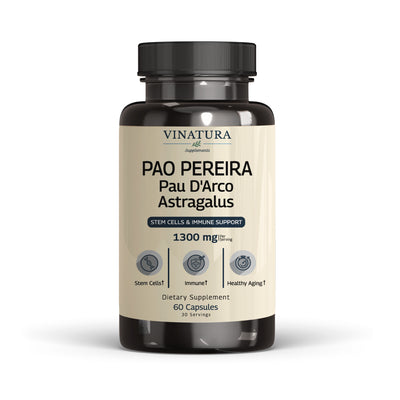
Artichoke vs. Milk Thistle: How to Combine & Which is Better?
Artichoke and milk thistle are two renowned herbs highly valued in traditional medicine. They can be combined to enhance health benefits, particularly for liver health. In today's article, we will reveal more about their origins, benefits, and side effects, as well as some comparisons and ways to combine artichoke and milk thistle.
Before exploring further, please read the disclaimer located at the end of this webpage.
Key Takeaways
- Milk thistle has benefits for protecting the liver and brain, and for supporting diabetes; however, it should be used cautiously to avoid side effects.
- Artichoke also supports liver protection, enhances digestion, and helps control blood pressure and cholesterol levels.
- Supplements containing extracts from both plants can provide the best results.
- One should choose the appropriate herb depending on individual goals and body conditions.
What Is Milk Thistle And Its Key Benefits For Human Health?

Milk thistle is a herbaceous plant with ancient origins from Europe. Nowadays, this plant can be easily found in North America, Africa, Australia, and Asia.
Silymarin is the main compound found in milk thistle. It plays a crucial role in improving liver function, as well as providing potent antioxidant and anti-inflammatory properties.
Key Benefits Of Milk Thistle
- Liver Protection: The compound silymarin in milk thistle has antioxidant and anti-inflammatory properties, which help inhibit free radicals and enzymes that cause inflammation. This protects the liver from damage, regulates immune responses, and balances antioxidant reactions. [1]
- Diabetes: Numerous studies have shown that silymarin may reduce diabetes [2]. This is especially significant for patients with liver disease caused by excessive alcohol consumption and diabetes. Specific effects include:
- Reducing Blood Sugar: In a study, participants with diabetes and cirrhosis due to alcohol consumption took 600mg of silymarin daily for six months. From the second month of the survey, silymarin showed an ability to improve blood sugar control effectively. [3]
- Reducing Insulin: In the same study, participants' insulin levels decreased by 20%, crucial for managing type 2 diabetes.
- Improving Biochemical Indicators: Silymarin helped improve indicators like malondialdehyde levels and urinary albumin, contributing to better long-term blood sugar control. [4]
- Brain Protection: Silibinin, the main component of silymarin, interacts with and binds to estrogen receptors, an essential protein that protects brain cells. This interaction helps protect the brain from negative impacts and damage, particularly from conditions like Alzheimer's disease. [5]
Potential Side Effects Of Milk Thistle
No severe side effects have been reported in users of milk thistle. However, some mild side effects have been noted, the most common being digestive issues such as bloating, indigestion, or diarrhea.
Additionally, individuals allergic to plants in the Asteraceae family may react to milk thistle, exhibiting symptoms like itching, rashes, eczema, and, in rare cases, anaphylactic shock.
Caution is advised when using milk thistle with medications such as contraceptives, statins, morphine, indinavir, ledipasvir, CYP2B6, CYP2C9, CYP3A4, glucuronidated drugs, P-glycoprotein, and sirolimus.
Artichoke: What Is It And How Does It Benefit Human Health?

Artichoke (also known as Cynara scolymus) originates from the Mediterranean region. Artichoke is often considered a superfood because it has a high antioxidant content, providing numerous health benefits.
Key Benefits Of Artichoke For Health
- Blood Pressure Control: In a study spanning 12 weeks using artichoke, participants with hypertension showed significant reductions in both systolic and diastolic blood pressure. [7]
- Cholesterol Control: Currently, no precise study demonstrates artichoke's direct cholesterol reduction effects. However, artichoke leaves function similarly to statins (medications that lower cholesterol levels), particularly in reducing LDL cholesterol levels. Therefore, artichoke contributes to the management of cholesterol. [6]
- Liver Health: In a study involving 100 participants with non-alcoholic fatty liver disease, randomly assigned to receive 600mg of artichoke extract daily for two months, results showed improved liver blood flow, reduced liver size, and portal vein diameter, enhancing liver health. [8]
Artichoke Potential Side Effects
Artichoke is a plant with a high FODMAP content, which means its use can potentially lead to digestive issues such as irritable bowel syndrome, bloating, and indigestion. Additionally, individuals with gallbladder issues should exercise caution when using this product, as artichoke may stimulate bile production.
Can You Take Artichoke And Milk Thistle Together?

Milk Thistle And Artichoke Benefits
Research has shown that milk thistle and artichoke are rich sources of bioactive compounds such as phenolic acids and flavonoids. Thus, these two plants can be used as natural antioxidants, incorporated into daily diets to reduce chronic diseases. [9]
Milk thistle and artichoke are also sources of phenolic compounds, which are highly regarded for their antibacterial properties. Among them, milk thistle contains the most diverse phenolic compounds, demonstrating antibacterial solid activity. [10]
Artichoke can inhibit the growth of HepG2 liver cancer cells, support liver function, and protect the liver from damage. Milk thistle also possesses similar liver cancer-fighting properties due to the compound silymarin. However, silymarin is more potent in reducing cancer cell growth and enhancing liver cell regeneration. [11]
In summary, artichoke and milk thistle have numerous beneficial effects, particularly in enhancing liver health. Their antioxidant properties help protect, improve, and regenerate damaged cells.
How To Combine Artichoke And Milk Thistle?
Products combining ingredients sourced from both of these plants are a preferred choice. However, selecting products from reputable brands that undergo third-party quality testing is crucial. Additionally, always use these products at recommended dosages as a healthcare professional advice.
Is Milk Thistle Or Artichoke Better For The Liver?

Both milk thistle and artichoke offer excellent benefits for the liver, and users can consider the following based on their needs:
- Milk Thistle: Suitable for individuals needing to address severe liver conditions due to its strong protective and regenerative effects on liver cells. [1]
- Artichoke: Ideal for supporting liver functions, improving digestion, and maintaining overall liver health. [8]
Choosing between the two herbs depends on specific health goals and conditions, ensuring that the selected herb aligns with individual health needs for optimal benefit.
Conclusion
In summary, milk thistle and artichoke offer significant benefits for the body, particularly the liver. Although they operate through somewhat different mechanisms, using them together can maximize their combined effects in improving overall health and supporting liver function.
References
- [1] Milk thistle (Silybum marianum) for the therapy of liver disease. American Journal of Gastroenterology, 93(2), 139-143 Flora, K., Hahn, M., Rosen, H., & Benner, K. (1998) https://pubmed.ncbi.nlm.nih.gov/9468229/.
- [2] The Therapeutic Potential of Milk Thistle in Diabetes. Rev Diabet Stud. 2014 Summer; 11(2): 167–174. Published online 2014 Aug 10. doi: 10.1900/RDS.2014.11.167.
- [3] Silymarin reduces hyperinsulinemia, malondialdehyde levels, and daily insulin need in cirrhotic diabetic patients, Velussi M, Cernigoi AM, Viezzoli L, Dapas F, Caffau C, Zilli M. https://www.sciencedirect.com/science/article/abs/pii/S0011393X05806605.
- [4] Effect of addition of silymarin to renin-angiotensin system inhibitors on proteinuria in type 2 diabetic patients with overt nephropathy: a randomized, double-blind, placebo-controlled trial. Am J Kidney Dis. 2012;60(6):896–903. https://www.sciencedirect.com/science/article/abs/pii/S0272638612008608.
- [5] Estrogen Receptors Are Involved in the Neuroprotective Effect of Silibinin in Aβ1–42-Treated Rats Original Paper Published: 03 February 2018 Volume 43, pages 796–805, (2018) https://link.springer.com/article/10.1007/s11064-018-2481-3.
- [6] The Effect of Artichoke Leaf Extract on Alanine Aminotransferase and Aspartate Aminotransferase in the Patients with Nonalcoholic Steatohepatitis, V. Rangboo, Mostafa Noroozi, Roza Zavoshy, Seyed Amirmansoor Rezadoost, Asghar Mohammadpoorasl First published: 11 May 2016 https://doi.org/10.1155/2016/4030476.
- [7] Effects of artichoke on blood pressure: A systematic review and meta-analysis. Volume 57, March 2021, 102668 https://doi.org/10.1016/j.ctim.2021.102668.
- [8] Efficacy of artichoke leaf extract in non-alcoholic fatty liver disease: A pilot double-blind randomized controlled trial. First published: 09 March 2018 https://doi.org/10.1002/ptr.6073.
- [9] Infusions of artichoke and milk thistle represent a good source of phenolic acids and flavonoids DOI: 10.1039/C4FO00834K (Paper) Food Funct., 2015, 6, 55-6.
- [10] Artichoke and milk thistle pills and syrups as sources of phenolic compounds with antimicrobial activity. Carla Pereira,a Lillian Barros,*ab Maria José Alves,c Celestino Santos-Buelga ORCID logo d and Isabel C. F. R. Ferreira*a https://pubs.rsc.org/en/content/articlelanding/2016/fo/c6fo00512h/unauth.
- [11] Synergisms in antioxidant and anti-hepatocellular carcinoma activities of artichoke, milk thistle and borututu syrups.Carla Pereira a, Ricardo C. Calhelha a b, Lillian Barros a, Maria João R.P. Queiroz b, Isabel C.F.R. Ferreira https://doi.org/10.1016/j.indcrop.2013.11.050.
Author

Product Disclaimer
The dietary supplement products mentioned on this website are formulated based on scientific research and adhere to FDA guidelines for dietary supplements. However, the content of the articles has not been evaluated by the Food and Drug Administration (FDA) and is not intended to promote or endorse any specific product. Any products sold on this website are not intended to diagnose, treat, cure, or prevent any disease.
Opinions and Endorsements
Any claims, statements, or opinions expressed in the articles are those of the author(s) and do not necessarily reflect the views or opinions of the manufacturers of the dietary supplement products. The products sold on this website are separate from the content of the articles and are not directly endorsed or associated with the information presented here.
Liability Disclaimer
The author(s) of the articles, website, and manufacturers of the dietary supplement products do not assume any liability for any potential consequences arising from the use of the information provided in the articles. It is recommended that individuals consult with a qualified healthcare professional before making any dietary or lifestyle changes, including the use of dietary supplements.
Product Usage
Please refer to the product labels and packaging for specific usage instructions and guidelines for the dietary supplement products sold on this website.
Customer Support
For any concerns or questions regarding the dietary supplement products, please contact our customer support team, who will be more than happy to assist you.





Leave a Comment
Be the first to comment.
What do you think?